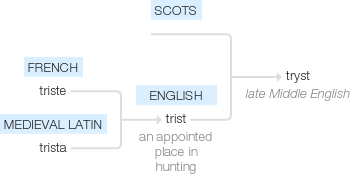Tryst
late Middle English (originally Scots): variant of obsolete trist ‘an appointed place in hunting’, from French triste or medieval Latin trista .
wiktionary
From Middle English tryst, trist, from Old French tristre(“waiting place, appointed station in hunting”), probably from a North Germanic source such as Old Norse treysta(“to make safe, secure”), from traust(“confidence, trust, security, help, shelter, safe abode”), from Proto-Germanic *traustą(“trust, shelter”), from Proto-Indo-European *deru-, *dreu-, *drū-(“to be firm, be solid”). Doublet of trust (which see).
etymonline
tryst (n.)
late 14c., "appointment to meet at a certain time and place," from Old French tristre "waiting place, appointed station in hunting," probably from a Scandinavian source such as Old Norse treysta "to trust, make firm," from Proto-Germanic *treuwaz "having or characterized by good faith," from PIE *drew-o-, a suffixed form of the root *deru- "be firm, solid, steadfast." The notion would be "place one waits trustingly." As a verb, late 14c. Related: Trysting.
